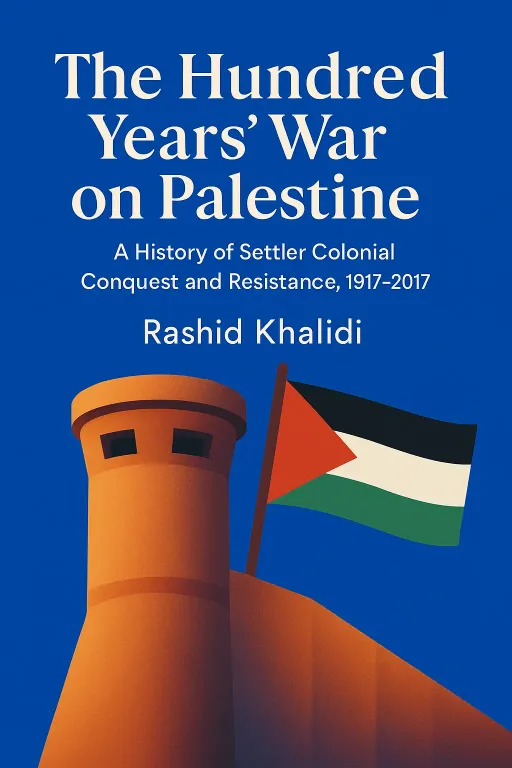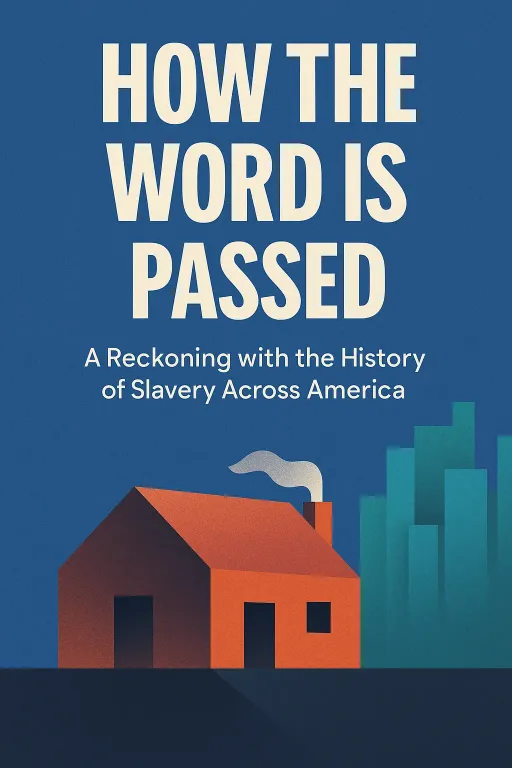
The Hundred Years' War on Palestine
12 minA History of Settler Colonial Conquest and Resistance, 1917-2017
Introduction
Narrator: In 1899, a former mayor of Jerusalem, Yusuf Diya al-Khalidi, sent a letter to Theodor Herzl, the founder of modern Zionism. He expressed respect for the Jewish people and understood their desire for a safe haven, but he delivered a stark warning. Palestine, he wrote, was not empty. It was an integral part of the Ottoman Empire and, more importantly, "it is inhabited by others." He predicted that a Zionist project to create a Jewish state there would inevitably lead to armed resistance from the indigenous Arab population. Herzl’s reply was dismissive, suggesting the native population would be grateful for the economic prosperity the Jewish settlers would bring. This exchange, over a century ago, contained the seeds of a conflict that would define the next hundred years.
In his book, The Hundred Years' War on Palestine, historian Rashid Khalidi argues that this is not a conflict between two equal national movements. Instead, it is a colonial war, waged by a settler movement backed by a succession of great powers—first Britain, then the United States—against the indigenous population, with the aim of taking their land.
The Conflict's Foundation is Colonial Conquest
Key Insight 1
Narrator: The central argument of the book is that the conflict over Palestine is fundamentally a settler-colonial one. This isn't a modern reinterpretation but an idea understood by the key actors from the very beginning. Early Zionist leaders were candid about their project's colonial nature. Ze'ev Jabotinsky, a prominent right-wing Zionist leader, wrote plainly that "every native population in the world resists colonists." He argued that Zionist colonization could only succeed "under the protection of a power that is independent of the native population—behind an iron wall, which the native population cannot breach."
This colonial mindset is perfectly illustrated in the 1899 correspondence between Yusuf Diya al-Khalidi and Theodor Herzl. Al-Khalidi, an educated Ottoman official, saw the inherent contradiction in the Zionist goal. He warned Herzl that the local population would not simply give up their homeland. Herzl’s response was a classic colonial trope: he acknowledged the existence of the non-Jewish population but dismissed their political rights, claiming they would benefit from the economic development brought by Jewish immigration. This exchange foreshadowed the core dynamic of the next century: the denial of Palestinian political rights and the reliance on an external imperial power to impose a new reality on the ground.
The 1948 Nakba Was a Product of External Power and Internal Weakness
Key Insight 2
Narrator: The 1948 war, which Palestinians call the Nakba or "Catastrophe," resulted in the displacement of over 750,000 people and was not simply a case of Zionist military superiority. Khalidi argues it was the culmination of decades of British policy, compounded by Palestinian institutional weakness and the self-interest of neighboring Arab states.
A poignant story from late 1947 captures this dynamic. As the UN vote on partition loomed, the prominent Palestinian leader Dr. Husayn al-Khalidi sent his brother, Ismail, with a message for King 'Abdullah of Transjordan. The Palestinians, he was to say, appreciated the King's offer of "protection" but could not accept it, as they desired independence, not a new ruler. Ismail delivered the message, and the King reacted with fury. Just then, news arrived that the UN had voted for partition. King 'Abdullah turned to Ismail and said coldly, "You Palestinians have refused my offer. You deserve what happens to you." This moment revealed the deep divisions and conflicting ambitions among Arab leaders, which left the Palestinians isolated at their most critical hour. This was compounded by a massive disparity in resources. While the Palestinian Arab National Fund struggled to raise 176,000 Palestine pounds, they learned that a single Jewish donor from South Africa had just given the Jewish National Fund one million pounds. This combination of external power plays, Arab disunity, and a lack of state-like institutions sealed the fate of Palestine in 1948.
Palestinian Agency Was Resurrected from the Ashes of Defeat
Key Insight 3
Narrator: The crushing defeat of 1967, when Israel conquered the West Bank, Gaza, Sinai, and the Golan Heights in just six days, seemed to be the final nail in the coffin for the Palestinian cause. The war cemented an unwavering alliance between the United States and Israel, and the resulting UN Security Council Resolution 242 famously referred to Palestinians only as a "refugee problem," erasing their political identity.
However, Khalidi argues that a central paradox of 1967 is that "by defeating the Arabs, Israel resurrected the Palestinians." The failure of Arab states to protect them spurred a new wave of independent Palestinian activism. This had been building since the 1950s but exploded after 1967. The Battle of Karameh in 1968 became a symbol of this revival. Though Palestinian fighters took heavy losses in the Jordanian town, their ability to stand up to the Israeli army—forcing it to retreat and leave behind damaged tanks—electrified the Arab world. It was a massive propaganda victory that transformed the image of the Palestinian fedayeen (freedom fighters) from victims to defiant heroes. This resurgence allowed Palestinians to reclaim what Edward Said called the "permission to narrate" their own story, seizing control of the PLO from Arab states and re-establishing themselves as an independent political force.
The 1982 Invasion of Lebanon Was a War to Erase Palestinian Nationalism
Key Insight 4
Narrator: By the early 1980s, the PLO had built a state-within-a-state in Lebanon, achieving significant diplomatic recognition around the world. For hard-line Israeli leaders like Menachem Begin and Ariel Sharon, this growing political legitimacy was a greater threat than PLO raids. The goal of the 1982 invasion of Lebanon, therefore, was not just to secure Israel's northern border but to destroy the PLO as a political and military organization and, with it, the idea of Palestinian nationalism itself.
The war was waged with overwhelming force and American diplomatic cover. The siege of Beirut and the subsequent massacres at the Sabra and Shatila refugee camps, carried out by Israel's Lebanese Phalangist allies while the Israeli army stood by, were devastating blows. The PLO was forced to evacuate from Lebanon, leaving its civilian population unprotected. This war was a brutal attempt to solve a political problem with military force—to eliminate the "Palestine question" by eliminating the organized body that represented it. While it succeeded in expelling the PLO, it failed to extinguish Palestinian nationalism, which would soon re-emerge in a different form.
The Oslo Accords Were a Flawed Peace Built on Unequal Power
Key Insight 5
Narrator: The First Intifada, a popular uprising that began in 1987, dramatically changed the conflict's image. Televised images of Palestinian youths with stones facing heavily armed Israeli soldiers damaged Israel's reputation as a David fighting an Arab Goliath. Defense Minister Yitzhak Rabin’s infamous "force, might, and beatings" policy, which involved soldiers systematically breaking protestors' bones, backfired spectacularly on the world stage.
This pressure, combined with the PLO's weakened position after the Gulf War, led to the Madrid Conference and the secret Oslo Accords. However, Khalidi argues the Palestinians entered these negotiations from a position of extreme weakness. The PLO leadership, exiled in Tunis, misunderstood the power dynamics in Washington and signed on to a deal that was essentially a repackaged version of Menachem Begin's old autonomy plan. The Oslo Accords created a Palestinian Authority with limited self-rule but left Israel in control of borders, resources, airspace, and the ever-expanding settlements. It was a framework for managing the occupation, not ending it. It failed to address any of the core issues—Jerusalem, refugees, settlements, or sovereignty—and ultimately locked the Palestinians into a subordinate position, worsening their situation on the ground.
The 21st Century Has Been Defined by a War on Gaza and Entrenched Occupation
Key Insight 6
Narrator: The failure of the Oslo process culminated in the Second Intifada in 2000, a far more violent and militarized conflict that destroyed the remaining trust between the two sides. The subsequent rise of Hamas, its election victory in 2006, and the disastrous internal Palestinian split led to Israel, with US and Egyptian backing, imposing a crippling siege on the Gaza Strip.
Khalidi frames the series of Israeli assaults on Gaza—in 2008, 2012, and 2014—as the latest "declaration of war." These operations were guided by the "Dahiya Doctrine," named after a Beirut suburb flattened by Israel in 2006. An Israeli general explained the doctrine bluntly: "We will apply disproportionate force on it and cause great damage and destruction there. From our standpoint, these are not civilian villages, they are military bases." This policy resulted in thousands of casualties and the systematic destruction of infrastructure in Gaza. It represents the modern face of the hundred years' war: the management of a captive population through overwhelming and periodic violence, with no political solution in sight.
Conclusion
Narrator: The single most important takeaway from The Hundred Years' War on Palestine is that the conflict is not an intractable ancient feud, but a modern colonial war sustained by the immense power of external empires. From the Balfour Declaration to the present day, the wishes of the indigenous population have been consistently overridden by the strategic interests of Great Powers, who armed, funded, and provided diplomatic cover for the colonization of Palestine.
The book challenges its readers to look past the dominant narratives and see the fundamental asymmetry at the heart of the conflict. It leaves us with a difficult but essential question: Can a just future be built on a foundation of inequality? Khalidi’s work suggests that until the world, and particularly the United States, stops supporting a system that privileges one people over another, this hundred years' war will not truly end. Peace can only begin when both peoples are granted the same measure of security, dignity, and rights.









